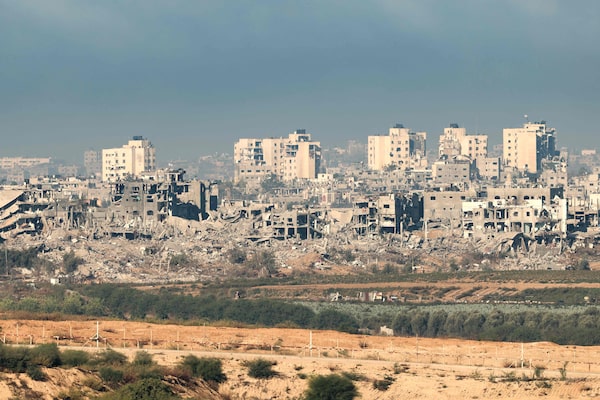
A picture taken from the border between Israel and Gaza shows heavily destroyed buildings in the Gaza Strip on Nov. 16.JACK GUEZ/AFP/Getty Images
Diana Buttu is a Palestinian-Canadian lawyer based in Haifa. She worked as a legal adviser to the Palestinian negotiating team from 2000 to 2007.
Israel’s bombing campaign of the Gaza Strip, after Hamas’s attacks on Israel on Oct. 7, has killed more than 11,000 Palestinians, almost half of them children, according to the Palestinian health authorities. Thousands remain trapped beneath the rubble. Israel’s military has attacked hospitals, schools, churches, mosques and universities, used white phosphorus shells in violation of international law, and levelled entire neighbourhoods.
The bombing has decimated the entire Gaza Strip. No one and nowhere is safe in Gaza. With Israel cutting off food, electricity, fuel, water supplies and communications – all illegal under international law – the UN continues to warn of a massive humanitarian disaster. People are beginning to starve to death and die of preventable diseases. More than a million people have been driven from their homes in northern Gaza in an act of ethnic cleansing. In a desperate plea to stop the bombing, children in Gaza last week resorted to holding a press conference in English to implore the world to halt Israel’s bombing.
Yet, despite this dire humanitarian disaster created by Israel – and despite what many scholars are calling genocide – Israel persists. Western governments, including Canada, have continued to support Israel as it carries out these crimes, despite the fact that the very purpose of the United Nations is to stop international crimes. Why? Because international inaction vis-à-vis Israel during this bombing campaign models precisely – albeit in more violent form – the ineffectiveness of the international system to rein Israel in.
As a legal adviser to the Palestinian negotiating team for many years, I strove to achieve Palestinian freedom and independence. In this role, I witnessed the inability of negotiations to end Israel’s brutal military occupation of the West Bank and Gaza. I also witnessed the impotence of the international community in the face of Israel’s war crimes.
Israel has imposed a cruel and illegal blockade on the Gaza Strip for more than 16 years, depriving Palestinians of their most basic rights. Even before the war, 95 per cent of Palestinians in the Gaza Strip lacked clean water, desperately needed medical care could not be accessed and more than 60 per cent of Gazans required food assistance to survive. UN agencies and international organizations have highlighted the devastating impact of the Gaza blockade for decades, with one UN agency predicting that Gaza would become “unliveable” by 2020. And it is.
Life for Palestinians in the West Bank holds its own perils. Take, for example, Israel’s theft of Palestinian land for illegal settlements. For decades, and up until today, successive Israeli governments have prioritized settlement construction over peace, with more than 750,000 settlers today living in more than 200 official and unofficial settlements. In the past month alone, Israeli settlers and the Israeli army have attacked scores of Palestinian towns, driving out Palestinians from their homes and villages and depopulating entire communities. Israel has killed 190 Palestinians in the process, including 42 children. Indeed, this unceasing settlement process amounts to an ongoing series of war crimes. The consensus among international human rights organizations today proclaims Israel as an apartheid state because of the system of Jewish supremacy and privilege that Israel has imposed on Palestinians.
As Israel’s settlement expansion, and numerous other affronts to the rule-based international order, have multiplied over the decades, the international response has been, at best, to express “grave concern” without any tangible action taken to halt Israel’s patently illegal actions or to hold it accountable. This abject international community failure to act has fuelled Israel’s crimes, with the settlements and settlers effectively normalized, particularly in the period since the signing of the Oslo Accords 30 years ago.
The continuing acceptance of unceasing Israeli violence against more than five million Palestinians living under occupation is baldly dehumanizing Palestinians. With the consensus among international human rights organizations, as well as a growing number of Israelis, that Israel is an apartheid state, it is long past time for Palestinians and the international community to reckon very sternly with Israel. It also is long past time for the international community to reject Israel’s illegal conduct and demands and, most importantly, to reject misguided thinking positing that Israel can only be safe if Palestinians are unsafe.
A new paradigm is needed now, one that prioritizes the rights of Palestinians to live in freedom over the desire of Israelis to occupy and steal Palestinian land and to maintain their privileges and dominance under Israel’s apartheid system. I often wonder what Palestine would look like today had the world, including Canada, stepped in to end Israeli apartheid half a century ago. I am certain we would not be seeing children pleading for the right to live.